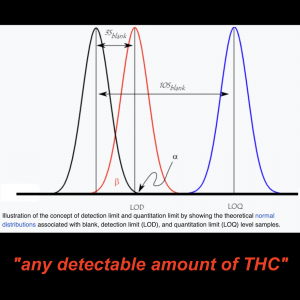WSLCB Cannabinoid Science Work Group members would be asked to help quantify the legislative mandate to ban products outside 502 containing “any detectable amount of THC.”
Here’s a look at cannabis-related policymaking events on the calendar in the week ahead.
Monday May 29th
The State of Washington recognizes the Memorial Day holiday.
Tuesday May 30th
WSLCB - Board Caucus
The weekly Washington State Liquor and Cannabis Board (WSLCB) Board Caucus was cancelled.
- [ Event Details ]
WA HCA - DBHR Listening Session
On Tuesday at 1:30pm PT, the monthly Washington State Health Care Authority (WA HCA) Division of Behavioral Health and Recovery (DBHR) Behavioral Health Service Provider Listening Session was scheduled to recur.
- [ Event Details ]
Wednesday May 31st
At publication time, no cannabis-related policymaking events were scheduled.
Thursday June 1st
WSLCB - Work Group - Cannabinoid Science - Public Meeting
On Thursday at 10am PT, the WSLCB Cannabinoid Science Work Group (WSLCB - Work Group - Cannabinoid Science) was scheduled to convene a bi-monthly meeting.
- [ Event Details ]
- The work group last met on April 6th.
- On Thursday, members would be prompted to discuss three themes:
- On the subject of “Human Safety Guidance” the work group had been asked: “Is there a way we could look at cannabis product classes (flower, edibles, distillate) versus a single crop since safety around consumption method could be very different?”
- Returning to the subject of the environmental pesticide actions agency staff undertook in April, members had been asked, “How does the level of a contaminant in the soil effect floral contaminant levels? Are there studies we could explore doing in the state on hemp with our local universities (accessing larger testing networks across state lines) to help generate data to guide planting decisions for production of ‘safe crops’?”
- During the May 24th WSLCB Board Meeting, I asked that board members and agency staff offer more public updates related to on-going environmental pesticide actions. Chair David Postman replied that “maybe next week’s caucus” could feature an update on the investigation from Enforcement and Education Director Chandra Wax before that event was cancelled (audio - <1m, video - WSLCB, video - TVW).
- Somewhat surprisingly, work group members would also be asked to offer “Insights around the definition of cannabis product and ‘any detectable amount of THC’” at issue in the implementation of SB 5367, “Concerning the regulation of products containing THC.”
- The revised definition of “Cannabis products” in the bill as passed by the legislature section 2(h)(1) is “useable cannabis, cannabis concentrates, and cannabis-infused products as defined in this section, including any product intended to be consumed or absorbed inside the body by any means including inhalation, ingestion, or insertion, with any detectable amount of THC.” Exceptions were drawn for cannabis health and beauty aids (CHABA) and “products approved by the United States food and drug administration” (e.g., Epidiolex).
- During the May 18th meeting of the Washington State Hemp in Food Task Force, Verda Bio CEO Jessica Tonani asked directly, "who's setting the detectable limit and how can we help facilitate that discussion?" Washington State Department of Agriculture (WSDA) Cannabis Programs Manager Trecia Ehrlich answered that the WSDA-led Cannabis Lab Accreditation Standards Program (CLASP) was the entity most likely to be given that responsibility. WSLCB staff weren’t concerned about THC detectability as the compound was expected in the items they regulated, she explained, and the impression she’d gotten from agency staff was that it was only “products that are outside the [initiative 502 market] that have to be concerned about detectability, and the LCB doesn't have anything to do with those products” (audio - 3m).
- Although not mentioned in the agency announcement about the event, links to four academic papers were published on the agency website in relation to the event:
- Cannabis Contaminants: Sources, Distribution, Human Toxicity, and Pharmacological Effects (Dryburgh et al., 2018)
- Cannabis Contaminants: Regulating Solvents, Microbes, and Metals in Legal Weed (Seltenrich, 2019)
- Regulatory Status of Pesticide Residues in Cannabis: Implications to Medical use in Neurological Diseases (Pinkhasova et al., 2020)
- Pesticides and Environmental Injustice in the USA: Root Causes, Current Regulatory Reinforcement, and a Path Forward (Donley, et al., 2022)
Friday June 2nd
WA Pharmacy Commission Legislative Committee - Public Meeting
The monthly Washington State Pharmacy Quality Assurance Commission Legislative Committee (WA Pharmacy Commission Legislative Committee) public meeting was cancelled.
- [ Event Details ]
- At publication time, the WA Pharmacy Commission Legislative Committee had not convened since March 17th, having cancelled their last seven scheduled meetings. The Committee was next scheduled to convene on July 7th.
